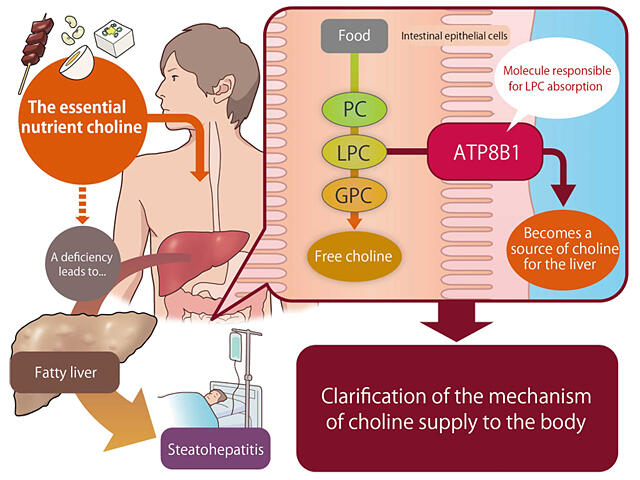A research group led by Graduate Students Ryutaro Tamura and Yusuke Sabu (at the time of research), and Associate Professor Hisamitsu Hayashi of the Graduate School of Pharmaceutical Science at the University of Tokyo and Dr. Tomohiro Ando, Chief Researcher at Axcelead Drug Discovery Partners, Inc. revealed the absorption pathway of choline, an essential nutrient. The study results were published in Nature Communications.

Provided by the University of Tokyo
The research group focused on the relationship between progressive familial intrahepatic cholestasis type 1 (PFIC1, a pathological liver condition) and extrahepatic symptoms, based on the fact that patients with PFIC1 develop steatohepatitis immediately after liver transplantation. The gene coding for ATPase phospholipid transporting 8B1 (ATP8B1) is known to be a causal gene of PFIC1.The research group generated mice in which different types of cell-specific ATP8B1 were knocked out and then analyzed the animal phenotypes. As a result, the mice with intestinal epithelial cell-specific ATP8B1 knocked out developed steatohepatitis, similar to the patients with PFIC1 who had undergone liver transplantation.
Metabolomic and lipidomic analyses of the plasma, liver, and intestinal epithelial cells revealed that in the ATP8B1-knockout mice, lysophosphatidylcholine (LPC, a choline-containing type of lysophospholipid) had accumulated in the intestinal epithelial cells, and the plasma and liver levels of free choline and its metabolites were lower than the levels in the control mice. Choline deficiency is known to cause triglyceride accumulation in the liver and steatohepatitis.
The research group hypothesized that ATP8B1 plays a role in the absorption of LPC in intestinal epithelial cells. This hypothesis was tested and verified in mice. Additionally, choline deficiency was detected in plasma samples of patients with PFIC1, similar to the results in mice, indicating that the findings from this study can be extended to humans.
This article has been translated by JST with permission from The Science News Ltd. (https://sci-news.co.jp/). Unauthorized reproduction of the article and photographs is prohibited.




